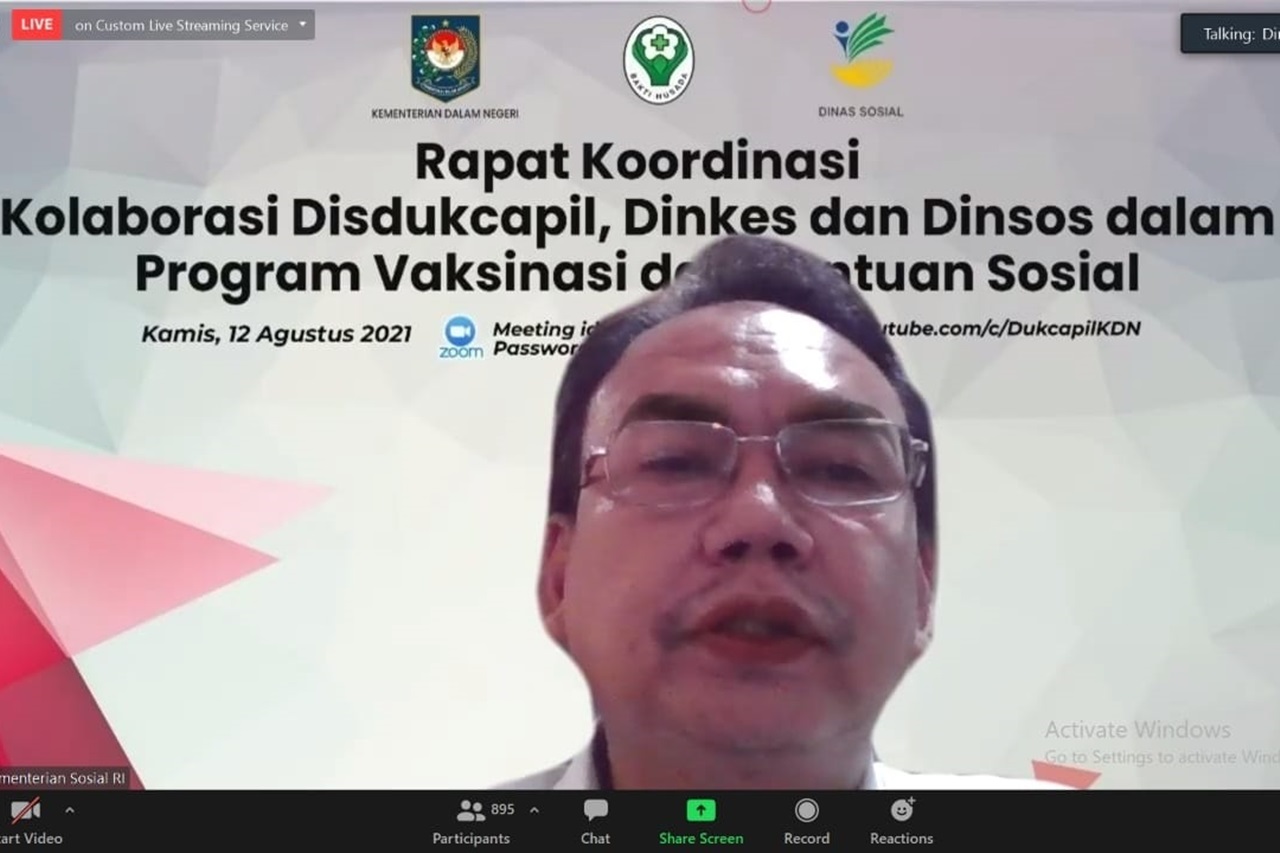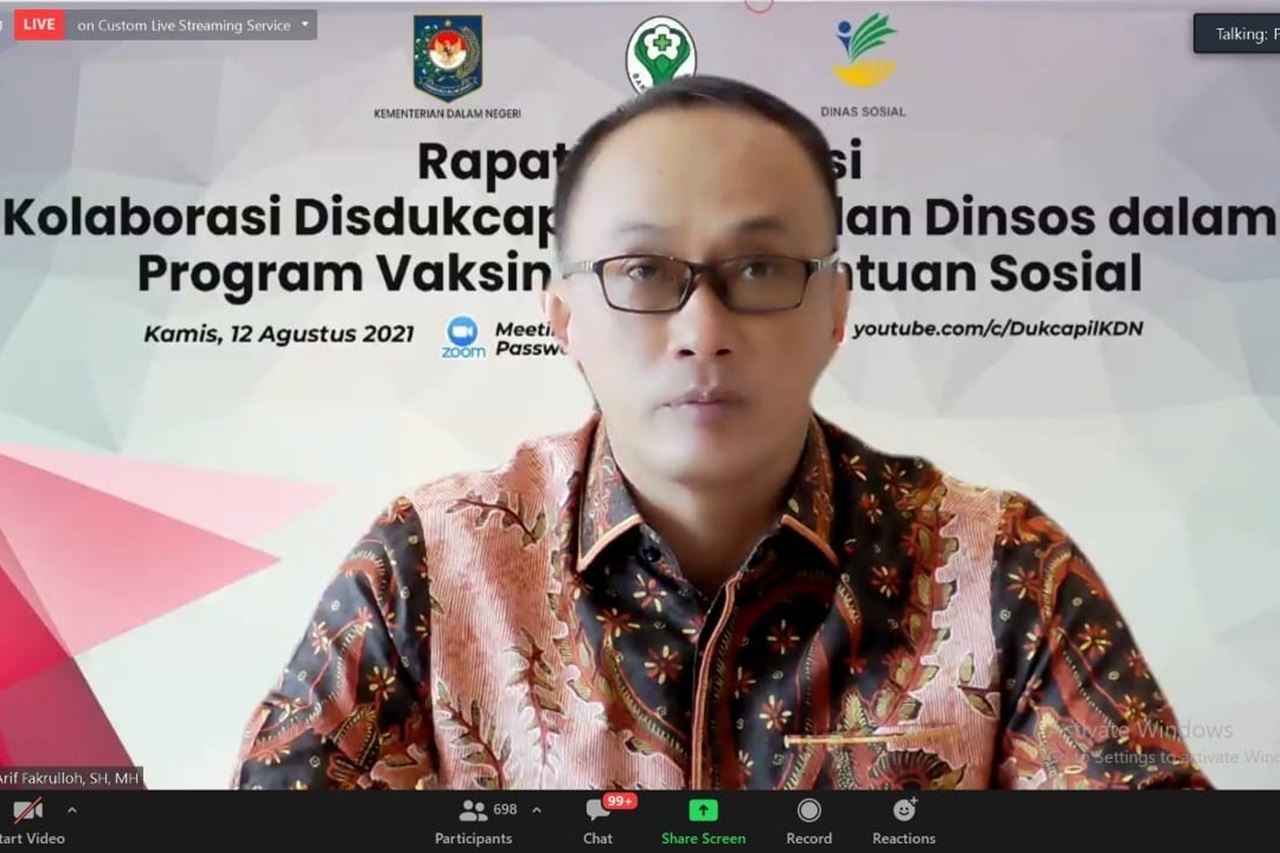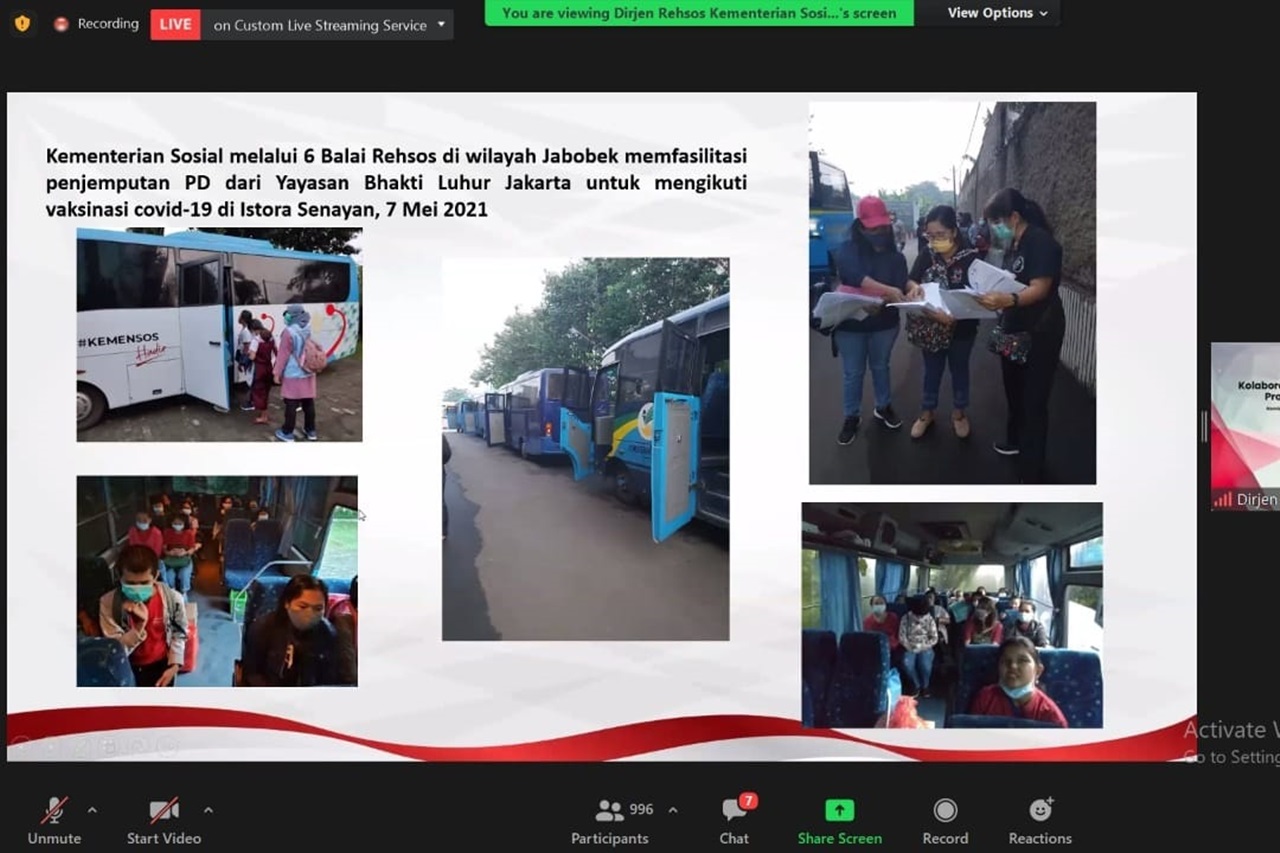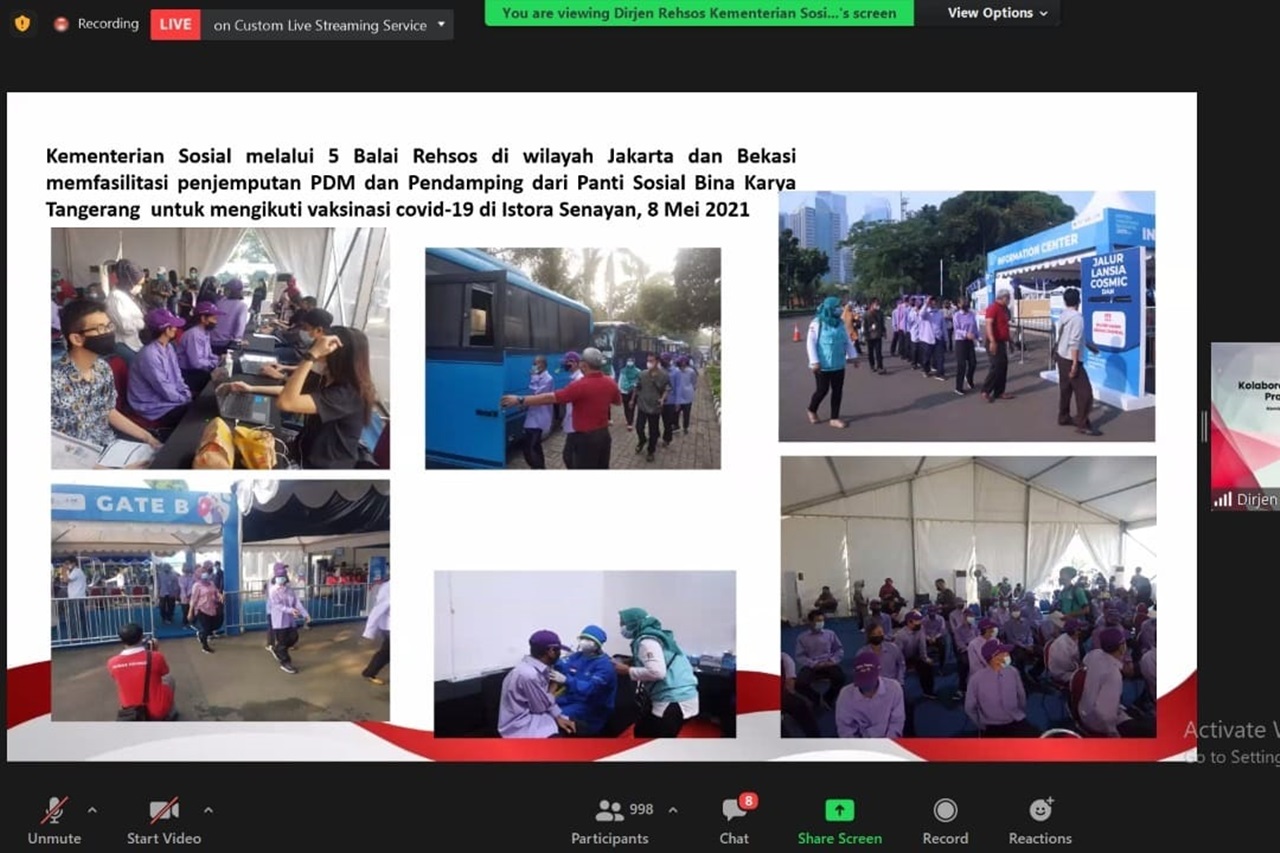JAKARTA (12 August 2021) - The Director-General
of Social Rehabilitation of the Ministry of Social Affairs, Harry Hikmat
attended the invitation of the Director-General of Population and Civil
Registration related to the Collaboration Coordination Meeting of Disdukcapil (Civil Registry and
Population Service), Health Service, and Social Service in Vaccination and
Social Assistance Programs.
This coordination meeting
followed up on the Circular Letter from the Secretary-General of the Ministry
of Health of the Republic of Indonesia, Number HK.02.02/III/15242/2021 on the
Implementation of Covid-19 Vaccination for Vulnerable Communities and other communities
who do not yet have a NIK (Population Identification Number).
Secretary-General of the Ministry
of Health, Kunta Wibawa Dasa Nugraha said that vaccination of vulnerable groups
and people without a NIK really needs attention, such as persons with
disabilities, remote indigenous community, residents of Correctional
Institutions, Persons with Social Welfare Problems (PMKS) such as abandoned
children, residents of social institutions, nursing homes, and other people who
do not have a NIK.
"So that vulnerable
groups and people who do not have a NIK get priority in providing vaccinations.
This implementation is coordinated with the Dukcapil and Social Services and
other related parties," said Kunta.
Special Staff to the
President of the Republic of Indonesia, Angkie Yudistia conveyed the direction
of the President, Joko Widodo on the Acceleration of Covid-19 Vaccination and
Distribution of Social Assistance, "Continuing the vaccination to quickly
build herd immunity. The government is the key to distribution and acceleration
of vaccination implementation because vulnerable people must be protected and
accommodated," President's direction through Angkie.
In addition, the
direction from the President of the Republic of Indonesia conveyed by Angkie:
cooperation with various parties, involving the elements of the community, and
the data on recipients of social assistance must be completely clear so that it
was right on target. Local governments are also involved in improving data.
Angkie also said that
vaccination is a momentum to improve population data, which is done by giving
priority, facilities, and easy access for the elderly and people with
disabilities to get Covid-19 vaccination services. Accelerate vaccination
services for persons with disabilities through health services and Covid-19
vaccination centers. As well as collaborating with communities, local
organizations, and private parties to mobilize Persons with Disabilities to
carry out Covid-19 vaccinations.
In this coordination meeting, the Director-General of
Social Rehabilitation, Harry Hikmat said that this opportunity was used to
ensure that vaccinations and NIK data collection were interconnected. "Of
course not only for persons with disabilities but also for neglected children,
children or their parents who are affected by Covid-19, the elderly, even
migrant workers in Indonesia who have problems and people with other social
welfare problems," said Harry.
Following up on the direction of the Minister of
Social Affairs of the Republic of Indonesia and the Regulation of the Minister
of Health (PMK) Number 84 of 2020 on the Implementation of Vaccination in the
context of the Covid-19 Pandemic Management. The Ministry of Social Affairs
supports in the effort to accelerate the Covid-19 vaccination for Persons with
Disabilities, namely coordinating with the Provincial/District/City Social
Services to collect data on persons with disabilities who need the Covid-19
Vaccine.
There are two mechanisms in targeting data collection,
namely the Top-Down data mechanism sourced from the relevant
Ministries/Institutions/Business Entities/Agencies. While the Bottom Up mechanism
is data collection that is carried out collectively by agencies/business
entities/institutions/organizations as well as by regional officials, puskesmas
(public health center) or health service facilities implementing the Covid-19
vaccination and coordinated by the Health Office, then submitted to the
Ministry of Health.
Harry Hikmat also conveyed that the total initial data
target throughout Indonesia was 564,080 with an estimated target of People with
Mental Disorders (ODGJ) in 2021 based on the prevalence of Basic Health
Research (Riskesdas) which was 490,047, while the target for Persons with
Disabilities at the Social Rehabilitation Center was 74,033. And the total
target data for Java-Bali is 338,352 with an estimated ODGJ of 295,061, while
people with disabilities are 43,291.
Support from the Ministry of Social Affairs in the
implementation of the Covid-19 vaccination for Persons with Disabilities,
namely, the Provision of Central Data, LKS for Persons with Disabilities, UPTD
as a target for the Covid-19 Vaccine for Persons with Disabilities; Assistance
for Persons with Disabilities during the implementation of Covid-19; Pick-up of
Persons with Disabilities to the place where the Covid-19 Vaccine will be
implemented; Coordination of the location/place for the implementation of the Covid-19
Vaccine, including providing a place for the implementation of Vaccination at
the Center.
For information, the Ministry of Social Affairs
collaborates with the UI Alumni Association at the Healthy Synergy Vaccination
Center to reach people who do not have access to vaccines. The institutions
that have been facilitated for PPKS to get vaccines are Social Rehabilitation
Center “Melati”, RPTC, LKS Sekar, LKS Balarenik, LKS Swara Peduli, 6 LKSAs in
Bekasi Regency with a total of 243 PPKS.
Also present was the Special Staff to the Minister of
Social Affairs, Don Rozano Sigit, explaining the assistance program that had
been carried out by the Ministry of Social Affairs, namely the Family Hope
Program (PKH) which was given to 10 million families with criteria for family
management and components, an index of assistance per year for pregnant women
and early childhood of Rp. 3 million; SD Rp 900 thousand; SMP 1.5 million;
Elderly and Disabled Rp2.4 million in the period January - December (paid every
3 months) and the mechanism used is cash transfer.
Non-Cash Food Assistance (BPNT) given to 18.8 million
families with PKH and Non PKH criteria, the aid index is Rp. 200.000,- per
month in the period January - December (14 months) with the mechanism used is
cash transfers, postal, basic necessities at e-Warong.
Furthermore, the Cash Social Assistance (BST) provided
to 10 million families with the criteria of Non PKH and Non BPNT and an index
of assistance of Rp. 300.000,- per month in the period January - June (6 months)
with the mechanism used by post.
In addition, there is also assistance that has been
carried out, namely BPNT PPKM which was given to 5.9 million families with
criteria other than the current recipients and an index of Rp. 200,000, - per
month in the period July - December (6 months) with the mechanism used is cash
and postal transfers.
The Director General of Population and Civil
Registration of the Ministry of Home Affairs, Zudan Arif Fakrulloh said that
the key words for people who do not have a NIK for social assistance and
vaccination programs are data collection and coordination. The Health Office,
Social Service or other agencies need to agree on the location of data
collection in administrative services.
"Our step is to coordinate this so that the
execution can be further. Let's continue to coordinate and continue to collect
data, serve the community", said Zudan.
This coordination meeting was attended virtually by
the Provincial/District Social Services, Provincial/District Dukcapil Offices,
Provincial/District Health Offices, and Heads of Social Rehabilitation Centers,
41 UPTs within the Ministry of Social Affairs.
 Bahasa
Bahasa
 English
English





